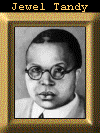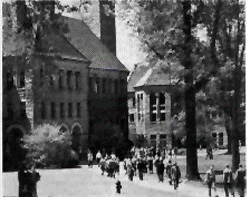





 As black students in a large predominately white American University, they were cut off from the many opportunities for mutual helpfulness, which come to groups of students through personal acquaintance and close association. Confronted by the social proscriptions of color common to American institutions of this era, hampered by limited means with the attendant circumstances of the average “poor” student, these students faced the future and boldly endeavored to find a way out of their difficulties, scarcely realizing, however, the importance of their action on subsequent generations of college students.
As black students in a large predominately white American University, they were cut off from the many opportunities for mutual helpfulness, which come to groups of students through personal acquaintance and close association. Confronted by the social proscriptions of color common to American institutions of this era, hampered by limited means with the attendant circumstances of the average “poor” student, these students faced the future and boldly endeavored to find a way out of their difficulties, scarcely realizing, however, the importance of their action on subsequent generations of college students.This desire to promote close association led to the organization of a social and literary club in which all of the members could participate at the regular periods of meeting. Members of the social study club enjoyed and benefited from the club’s “good times” as well as from the programs rendered at the meetings that dealt with the member’s major interests. This idea of the social study club flourished throughout the 1905-1906 school year, while thoughts on the formation of a fraternity lay dormant.
In the following school year, however, the organization of a fraternity took more definite form. The first few meetings of the year revealed that the drift of opinion was leading directly toward this type of fraternal organization. Certain necessary steps were taken towards the development of the organization’s name, initiation methods, due payment methods, future goals, etc. during these meetings. Throughout these meetings the idea to become a fraternity was discussed, but it was not until the meeting on an ice cold Tuesday, December 4, 1906 that the decision to organize a fraternity was officially made.
Hence, the first intercollegiate Greek-letter fraternity established for Black college students was organized. Founded by seven dynamic men affectionately known as Brother Jewel Henry Arthur Callis, Brother Jewel Charles Henry Chapman, Brother Jewel Eugene Kinckle Jones, Brother Jewel George Biddle Kelley, Brother Jewel Nathaniel Allison Murray, Brother Jewel Robert Harold Ogle, and Brother Jewel Vertner Woodson Tandy, it has continued to espouse the principles of good character, sound scholarship, fellowship, and the uplifting of humanity (especially the struggling Black minority in America). Thanks largely to its visionary founders, and early dedicated leaders, Alpha Phi Alpha has evolved through trial and struggle, and into one of the most prestigious organizations in existence today.
Most of the historical information is taken from The History of Alpha Phi Alpha by Brother Charles H. Wesley